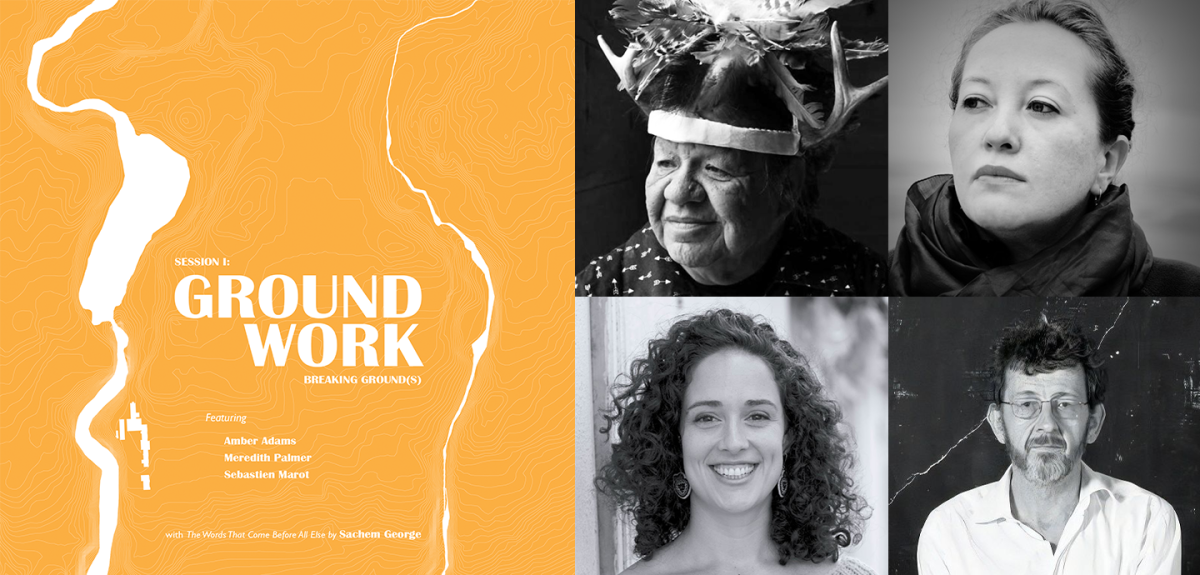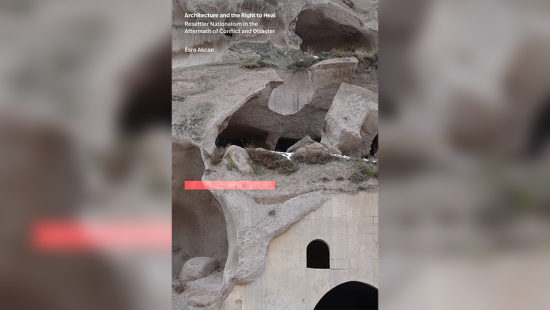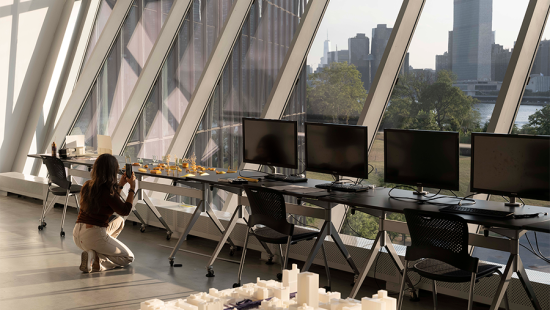Laying GROUNDWORK: Relationality, Land, and Ways of Knowing
Marking the Department of Architecture's 150th academic year, the first session of Breaking Ground(s), titled "GROUNDWORK," invites three leading voices who ask: How can we bring radically divergent histories of land and place into conversation?
 Portraits clockwise from upper left: Sachem Sam George, Dr. Amber Meadow Adams, Dr. Meredith Alberta Palmer, and Dr. Sébastien Marot.
Portraits clockwise from upper left: Sachem Sam George, Dr. Amber Meadow Adams, Dr. Meredith Alberta Palmer, and Dr. Sébastien Marot.
Following a keynote lecture by social anthropologist Timothy Ingold, the first session of this spring's Preston Thomas Memorial Symposium, titled "GROUNDWORK," will include lectures by Dr. Amber Meadow Adams, Dr. Sébastien Marot, and Dr. Meredith Alberta Palmer about relationality, land, and ways of knowing. Lectures will be followed by a discussion moderated by associate professor in the Department of History of Art and Visual Studies in the College of Arts & Sciences Jolene Rickard and associate professor of Architecture and director of the B.Arch. program Sean Anderson, asking: How can we bring radically divergent histories of land and place into conversation?
Opening with Sachem Sam George putting through Words That Come Before All Else, each speaker will introduce new perspectives on conventional histories surrounding the Upstate New York region / Gayogo̱hó:nǫ’ (the Cayuga Nation) and Cornell University. Adams' talk will focus on relation and responsibility as practiced in Haudenosaunee Creation philosophy. Adams is Lower Mohawk of the Six Nations at Grand River; she holds a Ph.D. in Indigenous Studies from the University at Buffalo and a B.A. in Literature and Writing from Columbia University. Her work forges creative writing and scholarship to illuminate the ethics of reciprocal relation across Haudenosaunee horticultural, familial, and intellectual practices. In reflecting on the interdependencies among these practices, Adams writes, "In Gayogo̱hó:nǫ’ and the other Haudenosaunee languages, each name for a familial relationship is a verb phrase describing a specific act: to parent is to hold, to be someone’s father is to be lent by another Clan family. Since reciprocity is a core piece of onkwehonwenéha, our way of doing things, each descriptive (and prescriptive) verb phrase carries the response action that will sustain the relationship. So, for human beings, the terms that describe this matrix present us with a set of instructions for maintaining our lives on Earth by maintaining our relationships with all other lives on Earth."
Adams will discuss the ways that settler-colonial institutions have historically ruptured these practices in campaigns of cultural erasure. She fundamentally challenges us to consider how we may bridge seemingly unbridgeable gaps in worldviews and fields of knowledge, in order to create new, life-sustaining relationships. "Relationship, narrative, and memory are built together (and yes, those denying the conversation are still part of it), or not at all."
Adams' talk will be followed by a lecture from Dr. Meredith Alberta Palmer — Tuscarora of Six Nations at Grand River — a Presidential Postdoc at Cornell University in the Department of Science & Technology Studies and the American Indian and Indigenous Studies Program. Palmer will discuss her ongoing research on the material histories of dispossession — including technologies of land survey, propertization, and profit — through which the very ground of the nation-state and its educational institutions, such as Cornell, have been 'founded.' Palmer explains, "Part of my scholarly work has been to describe the ways that making land into property has a very particular history rooted in anti-Indigenous racisms. This work has led me to research the development of land survey systems in the U.S., to find that the acre and the mile that square the plots so visible from airplanes on domestic flights, emerged from a colonial project birthed with the U.S. agrarian dream. This project is still at work today." She continues, "All Land Grab Universities were considered 'democracy’s institutions,' and they are based on some level of inclusivity to a broad educational endeavor. I want to turn this drive towards 'inclusivity' on its head and interrogate instead: How has Cornell, among other institutions, fashioned its own belonging on Gayogo̱hó:nǫ’ lands, and justified its dealings in Indigenous lands across the continent?" Palmer reminds us that relations of dominance are nevertheless still relations. Her work underscores the importance of centering existing Indigenous protocols in the search for possible ways of growing good relations, and in the challenging work of reparative redress.
Lastly, Dr. Sébastien Marot, professor of architectural history and theory at École d'Architecture in Paris-Est, will discuss Cornell's institutional history from the perspective of the three figures of Cornell's founding—A.D. White, Ezra Cornell, and Liberty Hyde Bailey (the inaugural Dean of the College of Agriculture). Marot recounts: "It so happens that the three major founders of Cornell University were a self-taught geotechnician and amateur farmer (Cornell), a liberal eclectic historian enthralled by the 'lessons of bricks and stones' of architecture (White), and an amazing horticulturist and proto-environmentalist...Each of them contributed a vision that actually shaped the physical campus of Cornell, and their respective legacies are all still readable on site." However, Marot suggests that calling accepted historical narratives and imaginaries into question would lead to a reconfiguration of institutional memory, and in turn, self-perception. "Universities like Cornell, which were funded by 'Land Grabs,' should naturally make it a point of honor to engage, in all their departments, in this quite demanding task of recollection. In my view, this exercise could be particularly exciting for the departments of Architecture, Art, Planning, Landscape Design, and Agriculture, all of whom might help each other out of the routines of irresponsible design practices that have plagued these 'disciplines' with decades of extractivism." Marot suggests that re-telling the history of this founding fraternity may help us rethink future relationships between architecture and agriculture, learn from "the limits of our biomes," and address an increasingly urgent global climate crisis.
Necessary for laying the groundwork properly for Breaking Ground(s) — a three-part symposium designed to invite participants to look backward in order to move forward — each speaker brings a critical perspective on the meanings and implications of the concept of "ground." Together, they pose challenging questions that demand effort, compassion, and attention. Symposium organizer, Associate Professor, and Chair of Cornell's Department of Architecture, Caroline O'Donnell, frames the first session: "We want to add a moment of reflection to the celebration of our anniversary, looking more deeply into our past as we move forward into the future. Revisiting our institution's foundation is important and provides a new perspective on what the next 150 years may hold." Such conversation is essential in order to transform how institutions, practice, and design mediate relationships between land, knowledge, and life.
Please visit AAP's spring 2022 Preston Thomas Memorial Symposium event page for complete and up-to-date information. Go here for AAP's full Art and Architecture anniversary programming.
Stay connected! Follow @cornellaap on instagram, facebook, twitter, and linkedIn; and subscribe to our AAP bi-weekly newsletter.







